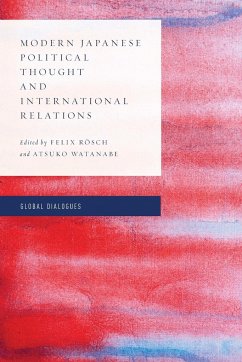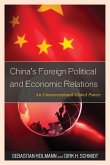Modern Japanese Political Thought and International Relations
Herausgeber: Rösch, Felix; Watanabe, Atsuko
Schade – dieser Artikel ist leider ausverkauft. Sobald wir wissen, ob und wann der Artikel wieder verfügbar ist, informieren wir Sie an dieser Stelle.
Modern Japanese Political Thought and International Relations
Herausgeber: Rösch, Felix; Watanabe, Atsuko
- Broschiertes Buch
- Merkliste
- Auf die Merkliste
- Bewerten Bewerten
- Teilen
- Produkt teilen
- Produkterinnerung
- Produkterinnerung
First book-length investigation of modern Japanese political thought and IR with a focus on non-western and indigenous Asian practices of IR.
Andere Kunden interessierten sich auch für
First book-length investigation of modern Japanese political thought and IR with a focus on non-western and indigenous Asian practices of IR.
Produktdetails
- Produktdetails
- Verlag: Globe Pequot Publishing Group Inc/Bloomsbury
- Seitenzahl: 270
- Erscheinungstermin: 16. September 2018
- Englisch
- Abmessung: 229mm x 152mm x 16mm
- Gewicht: 443g
- ISBN-13: 9781786603685
- ISBN-10: 1786603683
- Artikelnr.: 52417762
- Herstellerkennzeichnung
- Libri GmbH
- Europaallee 1
- 36244 Bad Hersfeld
- gpsr@libri.de
- Verlag: Globe Pequot Publishing Group Inc/Bloomsbury
- Seitenzahl: 270
- Erscheinungstermin: 16. September 2018
- Englisch
- Abmessung: 229mm x 152mm x 16mm
- Gewicht: 443g
- ISBN-13: 9781786603685
- ISBN-10: 1786603683
- Artikelnr.: 52417762
- Herstellerkennzeichnung
- Libri GmbH
- Europaallee 1
- 36244 Bad Hersfeld
- gpsr@libri.de
Felix Rosch is Senior Lecturer in International Relations, Coventry University. Atsuko Watanabe is Research Fellow at the Institute for Advanced Studies on Asia, University of Tokyo.
Japan as Potential: Communicating across Boundaries for a Global International Relations: An Introduction, Felix Rösch and Atsuko Watanabe / Part I: Challenging International Law and towards a Global IR? Investigations into Japan's Entry into the Westphalian System of Nation-States / Chapter 1. How Did Two Daos Perceive the International Differently? Atsuko Watanabe and Ariel Shangguan / Chapter 2. Japan's Early Challenge to Eurocentrism and the World Court, Tetsuya Toyoda / Chapter 3. K
tar
Tanaka (1890-1974) and Global International Relations, Kevin M Doak / Part II. Empire-Building or in Search for Global Peace? Japanese Political Thought's Encounter with the West / Chapter 4. Unlearning Asia: Fukuzawa's Un-regionalism in the Late Nineteenth Century, Atsuko Watanabe / Chapter 5. Pursuing a More Dynamic Concept of Peace: Japanese Liberal Intellectuals' Responses to the Interwar Crisis, Seiko Mimaki / Chapter 6. Rethinking the Liberal/Pluralist Vision of Japan's Colonial Studies, Ryoko Nakano / Part III. Local(ized) Japanese Political Concepts for a Twenty-First Century IR / Chapter 7. Who are the People? A History of Discourses on Political Collective Subjectivity in Post-War Japan, Eiji Oguma / Chapter 8. Amae as Emotional Interdependence: Analyzing Japan's Nuclear Policy and US-Japan Nuclear Cooperation Agreement, Misato Matsuoka / Chapter 9. The Pitfalls in the Project of Overcoming Western Modernity: Rethinking the Lineage of the Japanese Historical Revisionism, Hiroyuki Tosa / Part IV. Forming an Imagined Community, yet Reaching People Globally? Japanese Popular Culture in Historical Perspective / Chapter 10. From Failure to Fame: Sh
in Yoshida's Shifting Role in the Mythology of Modern Japan, Sean O'Reilly / Chapter 11. Hayao Miyazaki as a Political Thinker: Culture, Soft Power, and Traditionalism beyond Nationalism, Kosuke Shimizu / Chapter 12. Who's the Egg? Who's the Wall? - Appropriating Haruki Murakami's 'Always on the Side of the Egg' Speech in Hong Kong, Michael Tsang / Conclusion: Is there any Japanese International Relations Theory? Atsuko Watanabe and Felix Rösch / Notes on Contributors / Index
tar
Tanaka (1890-1974) and Global International Relations, Kevin M Doak / Part II. Empire-Building or in Search for Global Peace? Japanese Political Thought's Encounter with the West / Chapter 4. Unlearning Asia: Fukuzawa's Un-regionalism in the Late Nineteenth Century, Atsuko Watanabe / Chapter 5. Pursuing a More Dynamic Concept of Peace: Japanese Liberal Intellectuals' Responses to the Interwar Crisis, Seiko Mimaki / Chapter 6. Rethinking the Liberal/Pluralist Vision of Japan's Colonial Studies, Ryoko Nakano / Part III. Local(ized) Japanese Political Concepts for a Twenty-First Century IR / Chapter 7. Who are the People? A History of Discourses on Political Collective Subjectivity in Post-War Japan, Eiji Oguma / Chapter 8. Amae as Emotional Interdependence: Analyzing Japan's Nuclear Policy and US-Japan Nuclear Cooperation Agreement, Misato Matsuoka / Chapter 9. The Pitfalls in the Project of Overcoming Western Modernity: Rethinking the Lineage of the Japanese Historical Revisionism, Hiroyuki Tosa / Part IV. Forming an Imagined Community, yet Reaching People Globally? Japanese Popular Culture in Historical Perspective / Chapter 10. From Failure to Fame: Sh
in Yoshida's Shifting Role in the Mythology of Modern Japan, Sean O'Reilly / Chapter 11. Hayao Miyazaki as a Political Thinker: Culture, Soft Power, and Traditionalism beyond Nationalism, Kosuke Shimizu / Chapter 12. Who's the Egg? Who's the Wall? - Appropriating Haruki Murakami's 'Always on the Side of the Egg' Speech in Hong Kong, Michael Tsang / Conclusion: Is there any Japanese International Relations Theory? Atsuko Watanabe and Felix Rösch / Notes on Contributors / Index
Japan as Potential: Communicating across Boundaries for a Global International Relations: An Introduction, Felix Rösch and Atsuko Watanabe / Part I: Challenging International Law and towards a Global IR? Investigations into Japan's Entry into the Westphalian System of Nation-States / Chapter 1. How Did Two Daos Perceive the International Differently? Atsuko Watanabe and Ariel Shangguan / Chapter 2. Japan's Early Challenge to Eurocentrism and the World Court, Tetsuya Toyoda / Chapter 3. K
tar
Tanaka (1890-1974) and Global International Relations, Kevin M Doak / Part II. Empire-Building or in Search for Global Peace? Japanese Political Thought's Encounter with the West / Chapter 4. Unlearning Asia: Fukuzawa's Un-regionalism in the Late Nineteenth Century, Atsuko Watanabe / Chapter 5. Pursuing a More Dynamic Concept of Peace: Japanese Liberal Intellectuals' Responses to the Interwar Crisis, Seiko Mimaki / Chapter 6. Rethinking the Liberal/Pluralist Vision of Japan's Colonial Studies, Ryoko Nakano / Part III. Local(ized) Japanese Political Concepts for a Twenty-First Century IR / Chapter 7. Who are the People? A History of Discourses on Political Collective Subjectivity in Post-War Japan, Eiji Oguma / Chapter 8. Amae as Emotional Interdependence: Analyzing Japan's Nuclear Policy and US-Japan Nuclear Cooperation Agreement, Misato Matsuoka / Chapter 9. The Pitfalls in the Project of Overcoming Western Modernity: Rethinking the Lineage of the Japanese Historical Revisionism, Hiroyuki Tosa / Part IV. Forming an Imagined Community, yet Reaching People Globally? Japanese Popular Culture in Historical Perspective / Chapter 10. From Failure to Fame: Sh
in Yoshida's Shifting Role in the Mythology of Modern Japan, Sean O'Reilly / Chapter 11. Hayao Miyazaki as a Political Thinker: Culture, Soft Power, and Traditionalism beyond Nationalism, Kosuke Shimizu / Chapter 12. Who's the Egg? Who's the Wall? - Appropriating Haruki Murakami's 'Always on the Side of the Egg' Speech in Hong Kong, Michael Tsang / Conclusion: Is there any Japanese International Relations Theory? Atsuko Watanabe and Felix Rösch / Notes on Contributors / Index
tar
Tanaka (1890-1974) and Global International Relations, Kevin M Doak / Part II. Empire-Building or in Search for Global Peace? Japanese Political Thought's Encounter with the West / Chapter 4. Unlearning Asia: Fukuzawa's Un-regionalism in the Late Nineteenth Century, Atsuko Watanabe / Chapter 5. Pursuing a More Dynamic Concept of Peace: Japanese Liberal Intellectuals' Responses to the Interwar Crisis, Seiko Mimaki / Chapter 6. Rethinking the Liberal/Pluralist Vision of Japan's Colonial Studies, Ryoko Nakano / Part III. Local(ized) Japanese Political Concepts for a Twenty-First Century IR / Chapter 7. Who are the People? A History of Discourses on Political Collective Subjectivity in Post-War Japan, Eiji Oguma / Chapter 8. Amae as Emotional Interdependence: Analyzing Japan's Nuclear Policy and US-Japan Nuclear Cooperation Agreement, Misato Matsuoka / Chapter 9. The Pitfalls in the Project of Overcoming Western Modernity: Rethinking the Lineage of the Japanese Historical Revisionism, Hiroyuki Tosa / Part IV. Forming an Imagined Community, yet Reaching People Globally? Japanese Popular Culture in Historical Perspective / Chapter 10. From Failure to Fame: Sh
in Yoshida's Shifting Role in the Mythology of Modern Japan, Sean O'Reilly / Chapter 11. Hayao Miyazaki as a Political Thinker: Culture, Soft Power, and Traditionalism beyond Nationalism, Kosuke Shimizu / Chapter 12. Who's the Egg? Who's the Wall? - Appropriating Haruki Murakami's 'Always on the Side of the Egg' Speech in Hong Kong, Michael Tsang / Conclusion: Is there any Japanese International Relations Theory? Atsuko Watanabe and Felix Rösch / Notes on Contributors / Index




